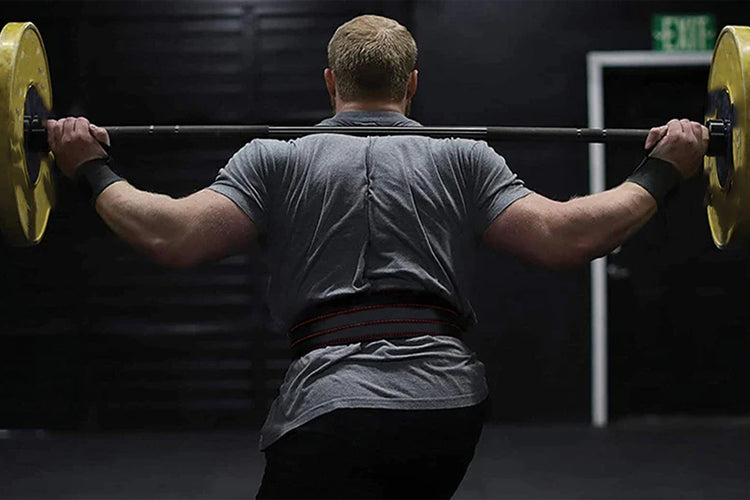So you finally got your hands on a brand spanking new lifting belt? Congratulations! But now, you're probably scratching your head, wondering how you're supposed to break it so it doesn't feel like you're strapping on a corset made of steel. Well, we've got some tips and tricks in store for you.
Tired of feeling like a stuffed sausage when lifting weights? But before you slap one on and start breaking personal records left and right, let's talk about something important: how to break in your belt? Do you need to do it?
How do you know when your belt is ready for action? And most importantly, will you suffer through a squeaky, stiff piece of leather for weeks? Fear not, my friends; we've got all the answers you need. Belts; they're not all created equal.
Some high-maintenance divas demand hours of breaking in before they consider embracing your waistline. Others are more easy-going, with a no-fuss attitude that requires no breaking in.
But no matter what type of belt you wear, the ultimate goal is to keep your pants in place without turning your midsection into a human vise. Whether you prefer a classic prong or a sleek lever, the key is finding the sweet spot between rigidity and flexibility. So strap in, fashion warriors, and prepare to conquer the world.
If you want a belt that lifts you like a superhero, you must break it like a pro. Don't expect to put it on your waist and immediately feel like Thor. Instead, try some of these tips to speed up the breaking in process: wear it often like your favorite pair of jeans, or roll it up like a sleeping bag after a camping trip.
You can even warm it up like a hot cup of coffee, add some weight like a backpack full of textbooks, or massage it with olive oil, rubbing alcohol, or petroleum jelly. Read on to explore more in this fantastic world of belts!
If you are more of a visual learner, here is a video describing how to properly break in a new weightlifting belt! Enjoy!
Is Breaking in a Belt Necessary?
It all starts with choosing a belt. Multiple belts are available in the market, like neoprene weightlifting belts, 10mm lever belts, 5mm powerlifting belts, and many more. Once you have chosen your right belt, the next step is breaking in.
Remember that feeling from childhood when you finally get the perfect pair of shoes, but they're just a little too stiff? Well, the same goes for belts! Breaking in a belt isn't mandatory, but it can make all the difference in comfort.
And who wants to feel more comfortable while looking stylish? Don't forget that not all belts are created equal-some may already come pre-broken in. It's a wild world out there, folks.
In the sweaty realm of weightlifting and gym-ratting, it's not unusual to see a trusty nylon velcro belt strapped on for support. These bad boys are like old shoes-they fit like a glove from day one.
But don't count out the tough guys with their rigid belts-they might need to put in some extra love to break them in. Especially the weightlifters, the wild and dynamic daredevils of the gym world.
Belts are not just for holding up your pants. Some have more stretch, so you won't need to wear them for weeks to get a good fit. Some people might like the feeling of a sturdy, inflexible belt, but others prefer something more pliable and won't leave them looking like they went around with Mike Tyson.
Getting the right fit for your belt is crucial, but how forcefully you want to break it in is all up to you. Whether you're a black karate belt or a hiking champion, finding the right level of snugness is essential. So tighten up, prepare to conquer the world, and remember that one belt at a time.
Factors That Affect a Belt's Break-In Time

Before you start strutting around like a boss, you should know that it will take some time for that bad boy to reach his full potential. How long, you ask? Well, there are a few factors to consider.
Things like thickness, material, usage, and if you're doing anything special to speed up the process. But don't worry; with patience, you can be rocking that belt like nobody's business in no time.
Breaking in a powerlifting belt can be as daunting as breaking through a brick wall, especially if you've got a 13mm thick one, which can feel like a never-ending battle. But fear not there's hope for your weary bruises!
If you don't have the time (or patience) to wrestle with a 13mm, a 10mm is the way to go. You'll be able to break it in much more efficiently without having to wage war on your skin. So say "hello" to your new 10mm friend and "goodbye" to the bruises that haunted you in the past.
Do you know that belts are like your new puppy-they need to be broken in before they're ready for the big leagues? While leather belts are the thickest and require some breaking-in tough times, other materials can support you without the drama.
But no matter what material your belt is made of, usage is the key to getting it comfy. So put that sucker to work and watch it transform from stiff and unwieldy to your lifting BFF.
So, are you ready to fast-track your belt-breaking-in process with these insider tips? Stay caught up while everyone else gets their belts in prime shape.
We've got the scoop on the top-secret strategies for speedy belt breaking-in that you will want to take advantage of.
Related Article: Leather Vs. Nylon Lifting Belt: Which One Should You Get?
How Long Does It Take to Break in a Lifting Belt?

Forget about Cinderella with her glass slippers; breaking in a lifting belt is the real endurance test. It can take a few days to get to the point where you can wear it for training, but you must keep rocking it for a couple of months for an entirely comfortable fit. The common perception is;
"The more you wear the belt, the quicker you can break it in."
The time it takes to break in your belt can vary depending on how tight you wear it, how often you wear it, and the size and material of the belt itself. To speed up the process, you can take extra measures to increase its flexibility.
On the first day, you want to give your belt an initial break-in, which can get it to the point where you can insert the prongs or fasten the lever relatively easily. But expect it to be something other than a walk in the park-it could take a day or two of rolling and manipulating.
Your new belt may be more of a pain than a fashion statement. Those pesky bruises and marks on your skin are not exactly the accessories you were hoping for. And let's not forget the envy you feel for your friend's effortlessly chic belts.
So, it may take a few weeks or even a few months to reach peak comfort levels, but trust us; it's worth the wait. So stick with it, and soon you can become a belt-wearing pro.
5 Ways to Break in a Lifting Belt
Now comes the question of how to break in a lifting belt. Cracking open a new lifting belt is exciting, but figuring out how to get it right can be daunting. Here are five tips for breaking in a lifting belt and maximizing your gains without breaking your bank account.
- Roll it tightly
- Warm it up
- Wear it often
- Use heavy objects
- Apply olive oil
1. Roll It Tightly
If you are ready to unleash your full strength at the gym, ensure your new lifting belt is up to par by giving it the ultimate break-in treatment-roll it tightly! This classic method can make your belt feel snug and supportive.
Roll it up in both directions, find a cozy spot to tuck it away, and let it set overnight. Your trusty lifting accessory can be ready to conquer any challenge you throw its way. Keep your fitness game strong by adding extra resistance to your workout routine. But don't let your gear weigh you down!
Say hello to the hip circle or resistance band, the perfect addition to your gym bag. It can give you an extra challenge during exercise and stay tightly coiled up due to its handy-dandy storage hack. So, why keep it together, and keep those muscles working hard?
2. Warm It Up
If the sun is shining and the pavement is hot enough to fry an egg, then go ahead and turn your car seat into a sauna for your leather belt. Giving it a toasty warm-up can make it bend and flex like a dream. Your belt can thank you for treating it better than a stale bagel.
But if you're enjoying the frosty chill of winter, don't even think about tossing your belt in the trunk for a chilly slumber. Keep it indoors where it can snuggle up in a cozy blanket and dream of warmer days.
When it's time to buckle up, your belt can hug your waist like a long-lost friend.
3. Wear It Often
Your new belt is like a newborn baby-it needs much attention and cares to grow strong and sturdy. One of the best ways to do that is to show it off as often as possible. Skip the bicep curls, but don't be afraid to let your belt join you during your warm-up routine
And when you're lifting, don't be shy about keeping it on, even if it initially feels unnecessary. Think of it as a bonding experience with your new accessory. Plus, having an extra support layer for you and your belt never hurts.
4. Use Heavy Objects
Let's face it we've all been there-struggling to undo that tightly cinched belt, drenched in sweat and out of breath. If you lack the hulk-like strength needed to crack that belt in half, grab a heavy object around your house-think kettlebell or weight-and let it do the heavy lifting.
Fold the belt like a pro and place the weight on top to apply added pressure. Move along the length of the belt, repeating this process until that stubborn accessory knows who's boss. Time to say goodbye to awkward tugs and unflattering bulges.
5. Apply Olive Oil
Do you have a beloved leather belt that's feeling stiff and inflexible? Because olive oil is here to save the day and your accessory. It can soften that belt like nobody's business and is also a great way to keep the leather in tip-top shape.
Just grab an old cloth, douse it in olive oil, and give it a good rubdown before bending and folding it to your heart's content. And the best part? You can indulge in this little leather spa treatment every few months to keep that belt looking fresh and fabulous.
Related Article: Should You Wear a Weightlifting Belt While Training?
Do All Lifting Belts Have a Break in Period?
Last but not least, do all lifting belts require a break-in period? As you know, slipping on a new lifting belt can feel like slipping into a pair of new sneakers-tight and stiff. But unlike those kicks, not all lifting belts require a break-in period.
While some might demand extra love and attention, you shouldn't sweat trying to break them in. The key here is to follow your manufacturer's instructions in the letter. They might have specific tips and tricks to ensure your belt stays in prime performing condition, and you would want to take advantage of those pro tips!
FAQs
1. What is a belt break-in?
Belt break-in is an essential process for proper drive belt performance. It involves stretching new belts or softening old ones to accommodate proper tension and flexibility. Without it, your drive belt may not function as intended and can cause damage to other components within your engine system.
2. Which belt efficiency is high?
Belts are incredibly efficient power transfer methods compared to other means of achieving the same end. The efficiency of a belt is primarily determined by the material used in its construction, design, and size. Leather belts are some of the most efficient because they are highly durable and hold their shape well over time, thus providing little slip during transmission. Stainless steel or Kevlar/Nylon reinforced belts can also yield high-efficiency ratings due to their strength and lack of deformation over time.
3. What is belt-breaking strength?
Belt breaking strength is the load capacity of a belt or webbing material that determines its resistance to breakage. It is one of the most critical factors in choosing the right belt type for any application. Higher tensile strength generally means better performance and more reliability when choosing a belt.
4. Mention 6 Ways to Break in a Lifting Belt.
The following are 6 ways to break in a lifting belt;
- Roll it up firmly.
- Heat it.
- Wear it a lot.
- Use heavy items.
- Add some olive oil (only if leather).
- Put some rubbing alcohol on.
Takeaway
If you want to rock a lifting belt during your next workout, you better break it in! The time it takes to get comfortable with your belt can vary depending on the material and thickness. For some, inserting the prongs or fastening the lever may take a few days of constant wear.
But fear not there are ways to speed up the process. Roll it, warm it, wear it-all while lifting heavy objects to get that belt broken in. And if you're struggling with a stubborn leather belt, try applying some olive oil to condition it and keep it in great shape. Remember that not all lifting belts need to be broken, so check with the manufacturer first.











